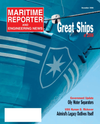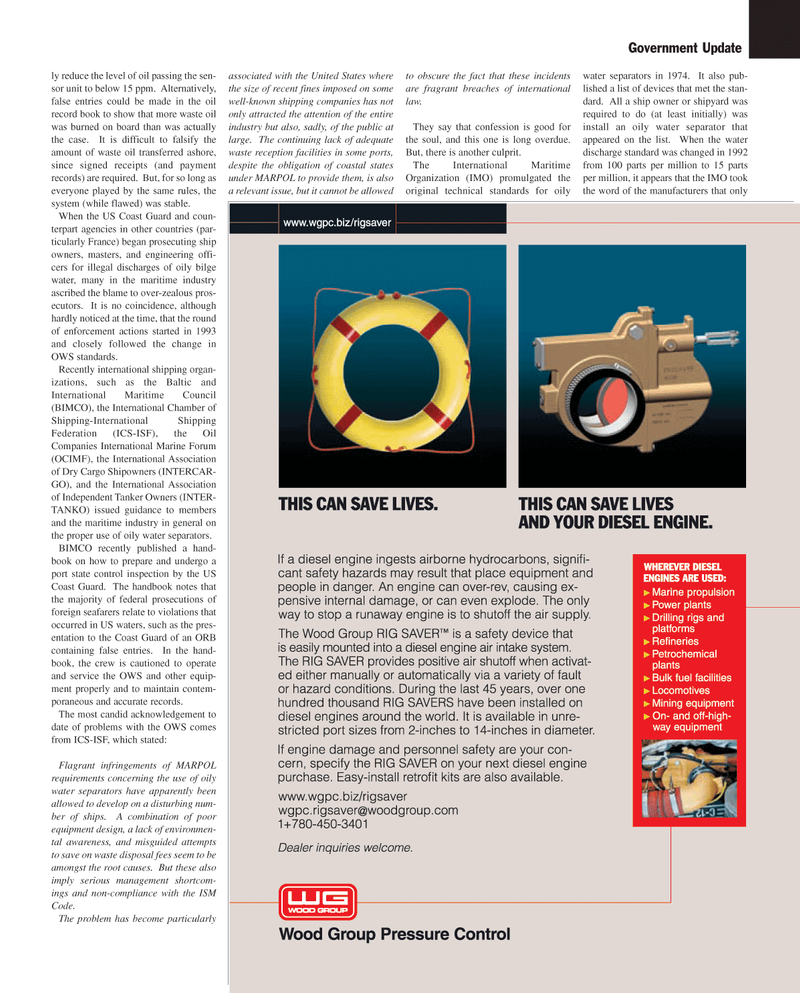
Page 15: of Maritime Reporter Magazine (December 2, 2006)
Read this page in Pdf, Flash or Html5 edition of December 2, 2006 Maritime Reporter Magazine
ly reduce the level of oil passing the sen- sor unit to below 15 ppm. Alternatively, false entries could be made in the oil record book to show that more waste oil was burned on board than was actually the case. It is difficult to falsify the amount of waste oil transferred ashore, since signed receipts (and payment records) are required. But, for so long as everyone played by the same rules, the system (while flawed) was stable.
When the US Coast Guard and coun- terpart agencies in other countries (par- ticularly France) began prosecuting ship owners, masters, and engineering offi- cers for illegal discharges of oily bilge water, many in the maritime industry ascribed the blame to over-zealous pros- ecutors. It is no coincidence, although hardly noticed at the time, that the round of enforcement actions started in 1993 and closely followed the change in
OWS standards.
Recently international shipping organ- izations, such as the Baltic and
International Maritime Council (BIMCO), the International Chamber of
Shipping-International Shipping
Federation (ICS-ISF), the Oil
Companies International Marine Forum (OCIMF), the International Association of Dry Cargo Shipowners (INTERCAR-
GO), and the International Association of Independent Tanker Owners (INTER-
TANKO) issued guidance to members and the maritime industry in general on the proper use of oily water separators.
BIMCO recently published a hand- book on how to prepare and undergo a port state control inspection by the US
Coast Guard. The handbook notes that the majority of federal prosecutions of foreign seafarers relate to violations that occurred in US waters, such as the pres- entation to the Coast Guard of an ORB containing false entries. In the hand- book, the crew is cautioned to operate and service the OWS and other equip- ment properly and to maintain contem- poraneous and accurate records.
The most candid acknowledgement to date of problems with the OWS comes from ICS-ISF, which stated:
Flagrant infringements of MARPOL requirements concerning the use of oily water separators have apparently been allowed to develop on a disturbing num- ber of ships. A combination of poor equipment design, a lack of environmen- tal awareness, and misguided attempts to save on waste disposal fees seem to be amongst the root causes. But these also imply serious management shortcom- ings and non-compliance with the ISM
Code.
The problem has become particularly associated with the United States where the size of recent fines imposed on some well-known shipping companies has not only attracted the attention of the entire industry but also, sadly, of the public at large. The continuing lack of adequate waste reception facilities in some ports, despite the obligation of coastal states under MARPOL to provide them, is also a relevant issue, but it cannot be allowed to obscure the fact that these incidents are fragrant breaches of international law.
They say that confession is good for the soul, and this one is long overdue.
But, there is another culprit.
The International Maritime
Organization (IMO) promulgated the original technical standards for oily water separators in 1974. It also pub- lished a list of devices that met the stan- dard. All a ship owner or shipyard was required to do (at least initially) was install an oily water separator that appeared on the list. When the water discharge standard was changed in 1992 from 100 parts per million to 15 parts per million, it appears that the IMO took the word of the manufacturers that only
Government Update
MR DECEMBER2006 #2 (9-16).qxd 12/5/2006 1:03 PM Page 15

 14
14

 16
16
